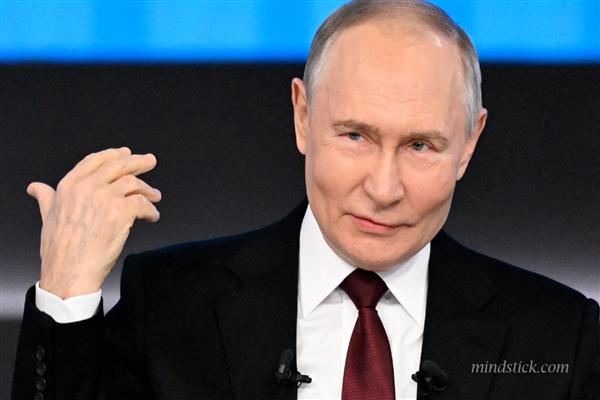
02-Jun-2025 , Updated on 6/12/2025 2:04:16 AM
Putin Warns NATO Nations Over "Bleed Russia Dry" Mission
Putin Responds to NATO Strategy
Russian Federation President Vladimir Putin has been clear in his rejection of NATO's updated strategic posture, saying Russia will take all measures necessary to ensure its national security. He condemned expansion and military build-up by NATO around the Russian borders, which it considers a direct threat to stability in the region. But Putin said, if continued, Russia would meet such encroachment, be it symmetrical or asymmetrical, with measures of symmetrical or asymmetrical response, including on the military level. NATO's actions precipitate instability, not Russia, and he dismissed claims that the country is a threat to NATO. Developments are being closely monitored by the Russian government, which has expressed its warning against any military deployments that will change the balance of power. Putin repeated that Russia is open to a dialogue, but will take decisive action to protect its sovereignty.
‘Bleed Russia Dry’ Explained
‘Bleed Russia Dry’ describes a strategy of wearing down Russia economically, militarily and politically by stretching out its costly involvement in conflicts, above all the war in Ukraine. This is a strategy of giving Ukraine enough sustained military and financial aid to wear down Russian resources over time. It hopes to impose heavy economic sanctions, cut off Russia from access to advanced technology and isolate it diplomatically. This is how Western nations, mainly NATO members, keep draining Russia's military supplies and economic capacity without actually fighting. It is an effort to make the Russian government calculate, to increase their internal pressure and make them less able to project power and force them to sort of reconsider their aggressive foreign policies.
Escalating Tensions in Eastern Europe
Geopolitical rivalries, military build-ups and continuing territorial disputes in Eastern Europe are mainly responsible for escalating tensions in that region. Russia and Ukraine remain in conflict, with ongoing hostilities, ongoing arms deliveries and shifting alliances making things worse. The security fears have also been heightened due to NATO's expanded presence in NATO member states near the region. Defence is reinforced, and military exercises are conducted with neighbouring countries. Regional stress is dependent on energy dependency and economic sanctions. Diplomatic response options remain sharply split among the international community, and few gains are made toward lasting answers. However, these developments demonstrate the vulnerability of peace in the region and the danger of further confrontation if tensions are not dealt with successfully.
Impact on Global Military Alliances
Global military alliances are deeply impacted by an evolving geopolitical landscape. Shifting power dynamics, regional conflicts, and new risks of cyber warfare and space militarisation are driving strategic realignments. Traditional alliances like NATO become new challenges by extending their strategic scope beyond traditional war. In response to China's growing influence, new alliances are forming – in the Indo-Pacific in particular. The U.S., meanwhile, continues building bilateral and multilateral defence partnerships (pact). Also, nations are now investing in joint military exercises, intelligence sharing and defence technologies. A more interconnected and responsive global defence framework emerges from these developments, which is characterised by mutual security interests driving collective solutions to transnational threats.
Future Risks of NATO-Russia Conflict
Geopolitical tensions, military buildups and rival security interests continue to pose significant future risks of NATO–NATO-Russia conflict. The major risk is the danger of miscalculation, escalation, and both sides are heavily concentrated on the Baltic or Eastern Europe. Indirect confrontation is further heightened too by cyber attacks, disinformation campaigns, proxy wars and a myriad of other problems. Expansion of NATO and Russian opposition to this are, in this regard, a source of distrust. A direct military clash would have far-reaching consequences that could pull in many other nations into a larger war. Quickly, an accidental engagement or strategic missteps could result in a serious risk to European and world security.

Technical Content Writer
Hi, this is Amrit Chandran. I'm a professional content writer. I have 3+ years of experience in content writing. I write content like Articles, Blogs, and Views (Opinion based content on political and controversial).
Join Our Newsletter
Subscribe to our newsletter to receive emails about new views posts, releases and updates.
Copyright 2010 - 2026 MindStick Software Pvt. Ltd. All Rights Reserved Privacy Policy | Terms & Conditions | Cookie Policy